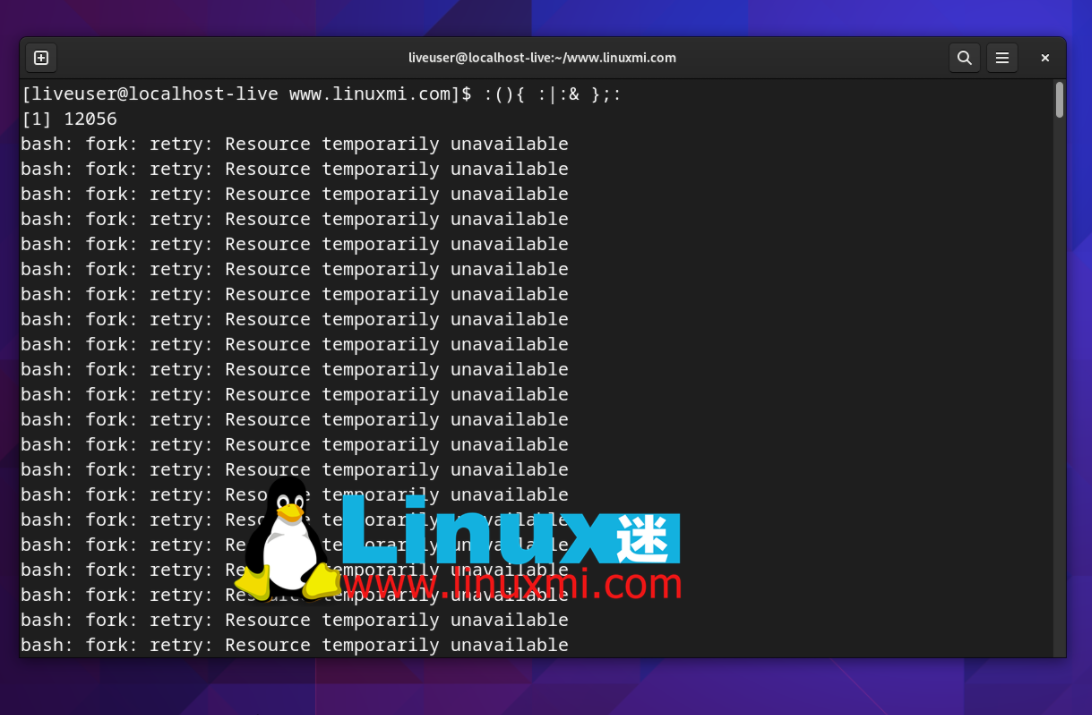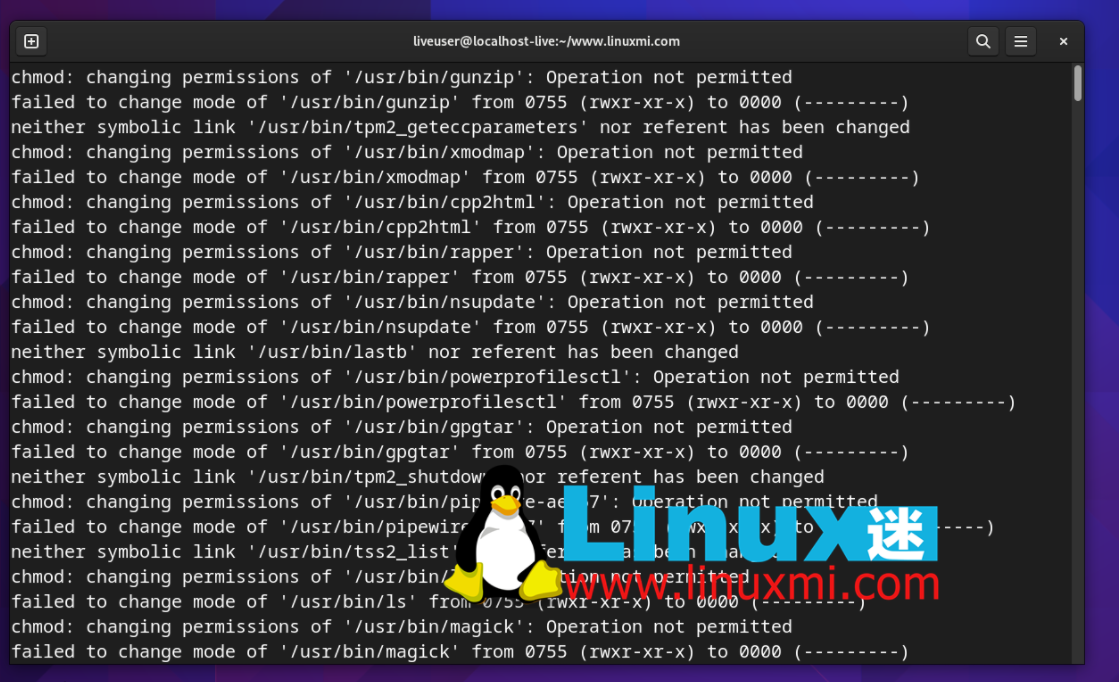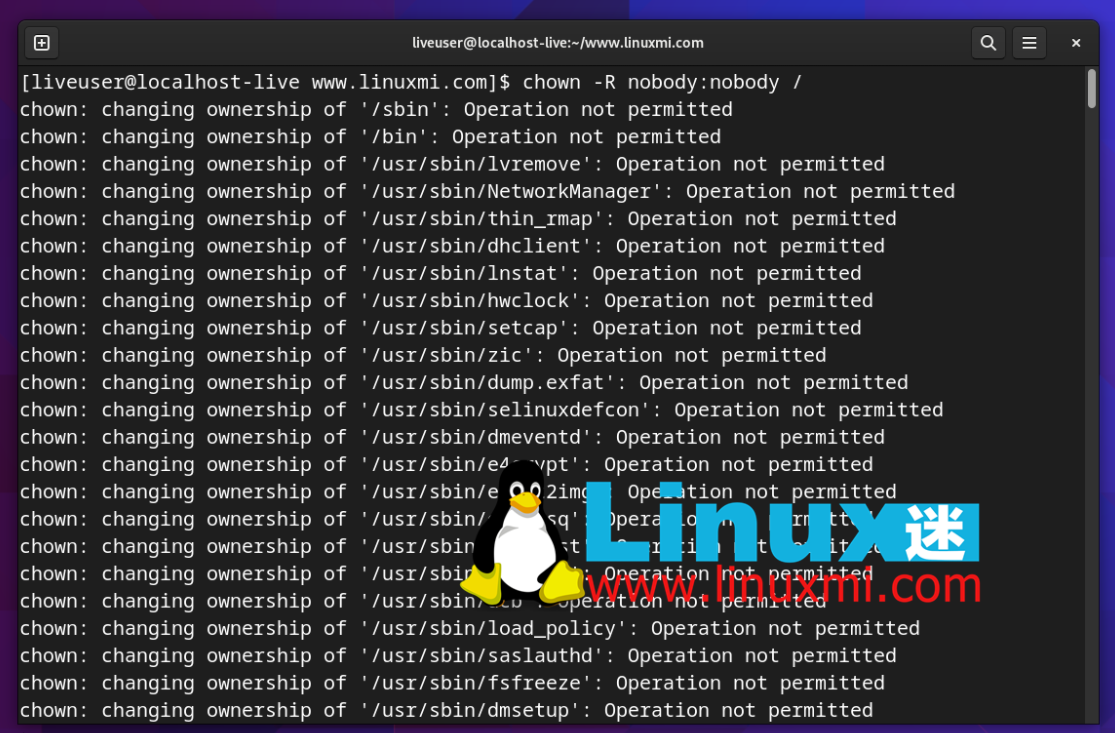7 commands that don't work on Linux and why you need to know!
As a Linux user, you may have mastered many commonly used commands, but did you know that some commands are not applicable to Linux systems? These commands may be common on other operating systems, but they don't work on Linux. Today, we will introduce 7 commands that do not run on Linux to let you understand why these commands cannot run on Linux.
So let’s start with this list of Linux commands that you should never run, and again I say do so with caution:
Linux commands you should never run
1- Format system disk
Linux administrators often use this command to format and assign a file system to a newly created disk partition. However, if used irresponsibly, it may also format data on the disk,
$ mkfs.ext4 /dev/sda
So when using this command, make sure you have selected the desired disk partition.
2- Delete the /etc or /boot directory
/etc contains all configuration files of the system, and /boot contains all kernel, InitRD and GRUB related files that are required for system startup. Deleting these folders will prevent your system from booting,
$ rm -rf /etc $ rm -rf /boot
Another way to remove configuration files from your system and render your system unrecoverable is to use the following command,
$ find / -iname "*.conf" -exec rm -rf {} ;
This will find and delete all files (configuration files) ending with .conf.
3- Delete the entire file system
Most of you probably know this command, it looks like this
$ rm -rf /
This will delete the entire file system from your server, deleting every byte of data on the disk.
4- Fork Bomb
This command will create copies of itself without limit, which will quickly use up all the memory and CPU of the system, causing the system to crash.
$ :(){ :|:& };:

This may also cause disk corruption.
5- Fill the disk with random data
$ dd if=/dev/urandom of=/dev/sda
This will fill the disk with random data. Another variation of this command overwrites the original data multiple times,
$ shred /dev/sda
Actually, this command is a useful tool, especially when you are getting rid of an old disk and don't want the data from the old disk to fall into the wrong hands (another method learned in the movie is that you can drill holes).
6- File permission confusion
All the above commands involve deleting or overwriting data. However, there are ways to use file permissions to render a system unusable. The first command is,
$ chmod -Rv 000 /

This command will remove all file permissions from all files or folders on the system. Since no one can access the files and folders, they will not be able to access them. This also leads to another way of writing the above command,
$ chown -R nobody:nobody /

This will also achieve the same output as the first command. Now the second file permissions command is actually the opposite of the first command,
$ chmod -R 777 /
This will change the permissions of all files and folders to world-writable. I'm sure you can imagine what would happen in this situation.
In this article, we introduce 7 commands that do not work on Linux. These commands may be common on other operating systems, but they do not work on Linux. Understanding the reasons for these commands is very important for Linux users, because it can help us better understand and master the Linux system. I hope this article has inspired you and given you a deeper understanding of the Linux system.
The above is the detailed content of 7 commands that don't work on Linux and why you need to know!. For more information, please follow other related articles on the PHP Chinese website!

Hot AI Tools

Undresser.AI Undress
AI-powered app for creating realistic nude photos

AI Clothes Remover
Online AI tool for removing clothes from photos.

Undress AI Tool
Undress images for free

Clothoff.io
AI clothes remover

AI Hentai Generator
Generate AI Hentai for free.

Hot Article

Hot Tools

Notepad++7.3.1
Easy-to-use and free code editor

SublimeText3 Chinese version
Chinese version, very easy to use

Zend Studio 13.0.1
Powerful PHP integrated development environment

Dreamweaver CS6
Visual web development tools

SublimeText3 Mac version
God-level code editing software (SublimeText3)

Hot Topics
 deepseek web version entrance deepseek official website entrance
Feb 19, 2025 pm 04:54 PM
deepseek web version entrance deepseek official website entrance
Feb 19, 2025 pm 04:54 PM
DeepSeek is a powerful intelligent search and analysis tool that provides two access methods: web version and official website. The web version is convenient and efficient, and can be used without installation; the official website provides comprehensive product information, download resources and support services. Whether individuals or corporate users, they can easily obtain and analyze massive data through DeepSeek to improve work efficiency, assist decision-making and promote innovation.
 How to install deepseek
Feb 19, 2025 pm 05:48 PM
How to install deepseek
Feb 19, 2025 pm 05:48 PM
There are many ways to install DeepSeek, including: compile from source (for experienced developers) using precompiled packages (for Windows users) using Docker containers (for most convenient, no need to worry about compatibility) No matter which method you choose, Please read the official documents carefully and prepare them fully to avoid unnecessary trouble.
 Ouyi okx installation package is directly included
Feb 21, 2025 pm 08:00 PM
Ouyi okx installation package is directly included
Feb 21, 2025 pm 08:00 PM
Ouyi OKX, the world's leading digital asset exchange, has now launched an official installation package to provide a safe and convenient trading experience. The OKX installation package of Ouyi does not need to be accessed through a browser. It can directly install independent applications on the device, creating a stable and efficient trading platform for users. The installation process is simple and easy to understand. Users only need to download the latest version of the installation package and follow the prompts to complete the installation step by step.
 BITGet official website installation (2025 beginner's guide)
Feb 21, 2025 pm 08:42 PM
BITGet official website installation (2025 beginner's guide)
Feb 21, 2025 pm 08:42 PM
BITGet is a cryptocurrency exchange that provides a variety of trading services including spot trading, contract trading and derivatives. Founded in 2018, the exchange is headquartered in Singapore and is committed to providing users with a safe and reliable trading platform. BITGet offers a variety of trading pairs, including BTC/USDT, ETH/USDT and XRP/USDT. Additionally, the exchange has a reputation for security and liquidity and offers a variety of features such as premium order types, leveraged trading and 24/7 customer support.
 Get the gate.io installation package for free
Feb 21, 2025 pm 08:21 PM
Get the gate.io installation package for free
Feb 21, 2025 pm 08:21 PM
Gate.io is a popular cryptocurrency exchange that users can use by downloading its installation package and installing it on their devices. The steps to obtain the installation package are as follows: Visit the official website of Gate.io, click "Download", select the corresponding operating system (Windows, Mac or Linux), and download the installation package to your computer. It is recommended to temporarily disable antivirus software or firewall during installation to ensure smooth installation. After completion, the user needs to create a Gate.io account to start using it.
 Ouyi Exchange Download Official Portal
Feb 21, 2025 pm 07:51 PM
Ouyi Exchange Download Official Portal
Feb 21, 2025 pm 07:51 PM
Ouyi, also known as OKX, is a world-leading cryptocurrency trading platform. The article provides a download portal for Ouyi's official installation package, which facilitates users to install Ouyi client on different devices. This installation package supports Windows, Mac, Android and iOS systems. Users can choose the corresponding version to download according to their device type. After the installation is completed, users can register or log in to the Ouyi account, start trading cryptocurrencies and enjoy other services provided by the platform.
 Why does an error occur when installing an extension using PECL in a Docker environment? How to solve it?
Apr 01, 2025 pm 03:06 PM
Why does an error occur when installing an extension using PECL in a Docker environment? How to solve it?
Apr 01, 2025 pm 03:06 PM
Causes and solutions for errors when using PECL to install extensions in Docker environment When using Docker environment, we often encounter some headaches...
 How to automatically set permissions of unixsocket after system restart?
Mar 31, 2025 pm 11:54 PM
How to automatically set permissions of unixsocket after system restart?
Mar 31, 2025 pm 11:54 PM
How to automatically set the permissions of unixsocket after the system restarts. Every time the system restarts, we need to execute the following command to modify the permissions of unixsocket: sudo...






